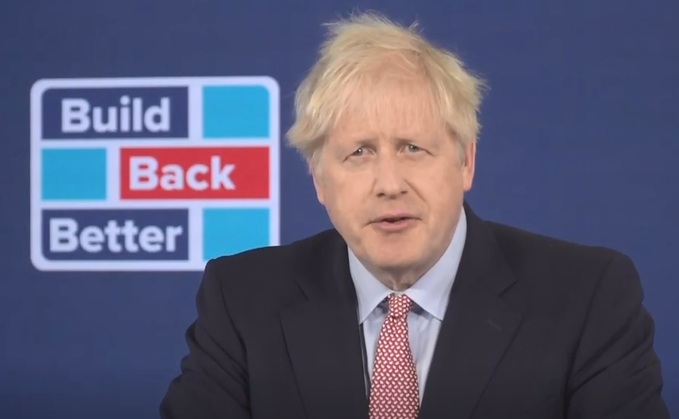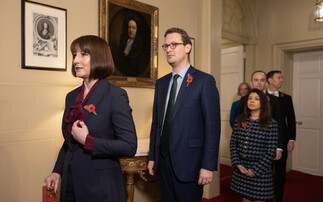
Boris Johnson's conference speech contained some encouraging rhetoric for the green economy, but the lack of tangible policies and strange silence on the net zero will leave business leaders feeling nervous
No one comes to a Boris Johnson speech for in-depth policy analysis - and good job too. Everyone knows what to expect: alliteration, knowingly terrible jokes, partisan attack lines, all judiciously mixed together with some free market ideology and culture war posturing, and seasoned with raw political cunning. The Prime Minister delivered in Manchester yesterday, in spades.
And yet, for all the rave reviews from those in the hall and Johnson's many media cheerleaders, this latest effort felt worryingly complacent. And it is not just Johnson's avowed political opponents and those angry at the queues at petrol stations saying so.
The CBI's reaction was laced with notable frustration. "The Prime Minister has set out a compelling vision for our economy," said director-general Tony Danker. "High wages, high skills, high investment and high growth. But the PM has only stated his ambition on wages. This needs to be backed up by action on skills, on investment and on productivity. Ambition on wages without action on investment and productivity is ultimately just a pathway for higher prices. It's a fragile moment for our economy."
It is indeed a fragile moment, and that fragility went completely unacknowledged by the Prime Minister.
This glossing over of the challenges the UK currently faces operated on two levels: the policy and the rhetoric.
On the policy front, it may have been a deliberate decision not to make any new announcements in Manchester, but it is not true that everyone was expecting a total absence of new policy, beyond the reheated proposals for more science teachers. The Times had been briefed that a new target to fully decarbonise the grid by 2035 would be confirmed. Other journalists were expecting news on rail links in the north of England. Neither materialised.
The absence of such announcements means the government now has just a handful of weeks to deliver massive decisions that should sit right at the heart of its net zero strategy. It is strange that the Prime Minister did not want to trail some of these moves yesterday. It is an absence that suggests crucial decisions have not yet been finalised.
As ever, the clock is ticking, and as a trio of reports yesterday made clear the opportunity to deliver a genuinely green recovery is being fumbled. Chancellor Rishi Sunak's failure to mention climate change at all in his speech earlier this week suggests the Treasury still hasn't internalised the scale and importance of the global green industrial revolution. There comes a point at which this failure becomes so glaring it has to be more conspiracy than cock-up.
The absence of any policy framework for Johnson's speech meant the rhetoric had to stand on its own two feet. It is arguable as to whether it was up to the task.
Johnson's idiosyncratic style is an acquired taste, but what was worrying here was the way the Prime Minister singularly failed to connect what are in many ways the two core long term goals of his administration: net zero and levelling up.
There were some encouraging words on the potential for offshore wind and rail links, a reminder of how important COP26 is, and the first prime ministerial endorsement of rewilding. But there was no real sense of how clean tech and decarbonisation are the animating mission that can drive the economic recovery, enable 'levelling up', and make a success of Brexit.
Number 10 has spent months quietly positioning net zero as one of its top priorities, and then decided to barely mention it.
Johnson could have condemned Insulate Britain campaigners while explaining that he would deliver the investment in energy efficiency that would protect Brits from soaring energy prices. He could have pledged to make the world leading UK the first country on the planet to decarbonise its grid. He could have talked of the reliability and appeal of electric vehicles and the value of rewilding in bolstering climate resilience. He could have drawn a line under the past 10 years by highlighting how his government will take climate action to the next level.
But to do so would have undercut Johnson's boosterism and forced him to acknowledge that the UK faces some grievous challenges. Consequently, he spoke of none of these things.
Net zero has apparently dominated the conference fringe and we are just a few weeks away from COP26 dominating the airwaves. The government has a broadly positive and fast-evolving story to tell. The UK genuinely is leading the world in developing and deploying the clean technologies that will shape the century. All of which makes the near complete absence of the climate crisis and the green opportunity from Ministers' speeches even harder to explain.
As Johnson would be the first to admit, words matter. As such it is hard to see the past few days as anything but a missed opportunity, at a time when the green economy and the wider country desperately needs both reassurance and a clear sense of direction in the face of the most serious short and long term challenges.
It is just a few days since Greta Thunberg characterised politicians' climate pledges as 'blah, blah, blah'. Thunberg's repeated insistence governments are doing nothing to curb emissions is often unfair, but following Johnson's strangely tone deaf speech you'd be hard pushed to argue with her.
A version of this article originally appeared in the BusinessGreen Overnight Briefing newsletter, which is available to all BusinessGreen subscribers.









